Toby Whithouse interview
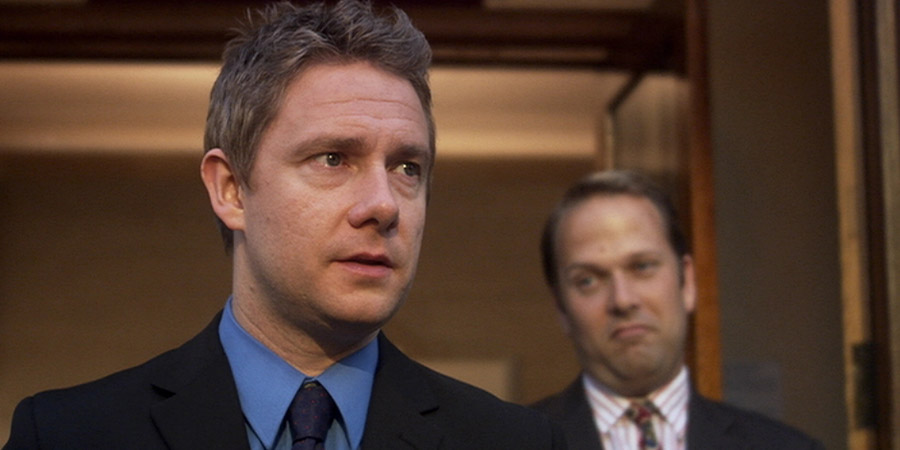
Toby Whithouse is one of Britain's top TV writers. Below, he talks to British Comedy Guide about creating Other People, his Channel 4 Comedy Showcase sitcom pilot...
Hi Toby, thanks for taking time to talk to us. Other People, your new comedy pilot, is being broadcast on Channel 4 this Friday. Could you tell us a little about it...
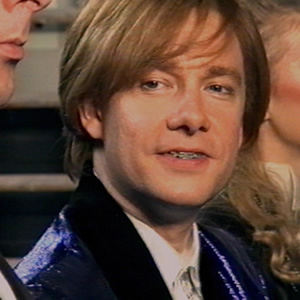
Martin Freeman plays Greg Wilson, a former teenage magician who regularly appeared on 1980s TV shows like Blue Peter and Wogan. The pinnacle of his career was appearing on the Royal Variety performance, in the presence of Princess Margaret. He was a pompous and pretentious and supremely annoying child. But his 15 minutes of fame came to an abrupt end when someone abused him during a phone-in on a Saturday morning children's TV show, live on air. It was the end of his career. No-one could take him seriously any more.
Twenty years later, he's still smarting from that humiliation. He's working in a leather sofa shop, with a delusional and bullying boss. Greg looks like just another life that failed to live up to its early promise. But his past isn't going to let him go so easily.
How did you come up with the idea for the premise?
I've been lucky enough to work with Martin Freeman twice before, in the theatre. For my birthday one year, he bought me a book about former child stars. The first chapter was about Gary Coleman, who played Arnold in Diff'rent Strokes. After the show was cancelled, Coleman's career evaporated and he ended up working as a security guard in WalMart. One day he was approached by a fan, asking for his autograph. For some reason they got into a fight. Coleman was charged with assault and forced to attend anger management sessions. I read it and thought 'A former child star in anger management... Now that's a sitcom right there!'
At first I imagined it like The Smoking Room, or the 80s sitcom Dear John. A regular cast of characters, having to attend anger management classes. I wrote the treatment and showed it to a comedy producer I knew. He said the most interesting character was Greg, the former child star, and that it would be far more interesting to just follow his story.
I re-wrote the treatment and showed it to Tom Grieves, a producer at Company Pictures. They really liked it and commissioned the first script. Which we then took to Channel 4.
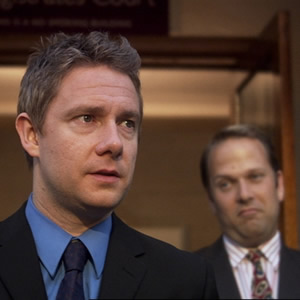
How long did it take to write the script - from first draft to the transmitted version?
I think it was probably a few years. But within that I'd disappear and write an episode of Doctor Who and Torchwood and Hotel Babylon and develop other projects of my own, so it's been a bit sporadic.
When writing Other People did you know who any of the characters would be played by or had they not been cast by that point?
I always knew I wanted Martin to play Greg. Martin is an extraordinary talent and a gift to a writer. He has such an instinctive understanding of comedy. You can write complex lines, complex gags, and know he can pull it off. No one else was cast until we had the first episode green-lit.
Going back a bit, how did you get into the world of script writing?
I was an actor for a long time. The move into writing was partly prompted (rather arrogantly) by a frustration with the standard of the scripts I was being sent, and partly because I wasn't actually getting any of the jobs. I started writing a play - mainly because it gave me something to do . It was called Jump Mr Malinoff Jump, and was about a family of second generation Russian immigrants living in Southend.
The plan was I'd put it on in a little pub theatre, with my other unemployed actor mates. But it kind of took on a life of its own. I sent it to a literary agent. She sent it to Soho Theatre, who advised me to enter it into a competition they ran called The Verity Bargate Award. I did, and it won. Then Soho decided to make it the opening production of their new and rather lovely theatre in Dean Street. Among the cast was a relatively unknown actor called Martin Freeman.
I'd started to get TV writing jobs by now - Where The Heart Is and Attachments - and things took off from there.
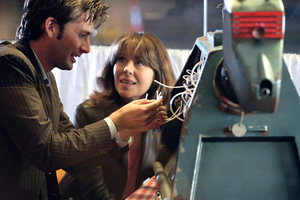
As you've touched upon, you've written for a lot of Britain's top rated dramas. Which one did you enjoy writing for most, and which was the hardest?
It's a cliche, but I've enjoyed them all in different ways. Doctor Who is obviously a very high-profile show. The thing that, for me, took the most adjusting to wasn't the sci-fi element or the show's history, but the time slot. I'd never written anything for that audience and that time. It demanded a completely different narrative style and tempo and tone to what I was used to. But I loved it and I'm incredibly proud to have written on it.
Torchwood was a mental show! When they hired me, the producers were still working out what the show was. Once we'd worked out the story for my episode, the producers told me to just go away and write it the way I wanted. So I did. I just wrote a script I would like to see. It seemed to do the trick, and it ended up being one of the easiest jobs I've ever done.
Is it difficult to come into an established series like Dr Who where the characters have already been defined by other people?
Sometimes it's a blessing. All the hard work has been done for you.
Fair enough! Is writing comedy much different from writing for a drama?
It couldn't be more different. It's been a real eye-opener for me. Writing comedy is 100 times harder than writing drama. I love the challenge of it though.
I tend to be writing two scripts at any one time - and the more different the scripts are, the better. I actually like this way of working. Maybe I have a very short attention span, but I like being able to dip into one for a few days, then dip into the other.
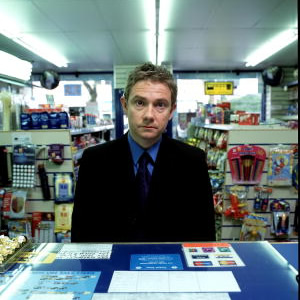
Do you have any advice you can pass on to the aspiring comedy writers reading our website?
Write only what makes you laugh. I remember years ago hearing an interview with Jarvis Cocker. It was soon after Common People came out. Even though Pulp had been going for years, suddenly they had become noticed and popular. The interviewer asked why he thought they had suddenly been recognised. He said the secret was to never change what you do. Never alter your work to fit in with the world. You have to wait for the world to change to fit you.
Would you be interested in writing a full series of Other People if given the chance?
Without a doubt!
Any other up-and-coming projects you can tell us about?
I've written a supernatural drama that starts filming in mid-October. It's a similar set-up to what we're doing with Channel 4. It will form part of a series of drama pilots that will be broadcast on BBC3 next year. My one is called Being Human, and it couldn't be more different to Other People.
And finally, here's a question we ask everyone: excluding your own shows, what are your favourite comedies?
Well, The Office and Partridge obviously. The first two series of The League of Gentlemen were, I thought, some of the most imaginative and brilliant TV I'd ever seen. I am a huge fan of Chris Morris, and absolutely loved The Day Today and Brass Eye.
Father Ted and Phoenix Nights are great. And Frasier and Seinfeld and Cheers. I also loved Marion and Geoff and am really enjoying Gavin and Stacey now. The first few episodes of Director's Commentary made me laugh so much I had to stop the tape and get up and walk around the room for a bit to calm down.
Thanks ever so much for the great insight Toby, and all the best with your current projects!

